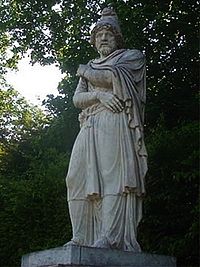Portal:Zoroastrianism
 Religion
Religion
Atheism- Creationism
- Mythology
- Nontheism
- Occult
- Spirituality
African (Serer) - Bábism (Bahá'í Faith)
-
 Buddhism (Mahayana
Buddhism (Mahayana - Tibetan
- Vajrayana)
- Chinese (Confucianism
- Falun Gong
- Taoism)
-
 Christianity (in China
Christianity (in China - in India)
- Seventh-day Adventism
- Anabaptism
 Anglicanism
Anglicanism- Arminianism
- Baptist
- Calvinism
- Christadelphianism
- Eastern (Oriental Orthodoxy
- Syriac)
- Latter Day Saints (Book of Mormon
- LDS Church
- Community of Christ)
- Lutheranism
- Methodism
- Roman Catholicism (Pope
- Bible
- Saints)
- Heathenism
- Hellenismos (Greek mythology)
- Indian (Ayyavazhi)
 Hinduism (mythology
Hinduism (mythology- Ravidassia)
- Jainism
- Sikhism
-
 Islam (in China
Islam (in China - in Russia
- Shia
- Ahmadiyya
- Sufism
- Quran)
- Judaism (Kabbalah)
-
 Scientology
Scientology - Shinto
- Wicca
- Zoroastrianism
|
|
Zoroastrianism is the religion and philosophy based on the teachings ascribed by the prophet Zoroaster (Zarathustra, Zartosht). Mazdaism is the religion that acknowledges the divine authority of Ahura Mazda, proclaimed by Zoroaster.
As demonstrated by Zoroastrian creed and articles of faith, the two terms are effectively synonymous. In a declaration of the creed — the Fravarānē — the adherent states: "…I profess myself a devotee of Mazda, a follower of Zarathustra." (Yasna 12.2, 12.8)
While Zoroastrianism was once the dominant religion of much of Iran, the number of adherents has dwindled to not more than 200,000 Zoroastrians worldwide, with concentrations in India and Iran.
Lua error in package.lua at line 80: module 'Module:Box-header/colours' not found. Ahura Mazda (Ahura Mazdā) is the Avestan language name for a divinity exalted by Zoroaster as the one uncreated Creator, hence God.
The Zoroastrian faith is described by its adherents as Mazdayasna, the worship of Mazda. In the Avesta, "Ahura Mazda is the highest object of worship", the first and most frequently invoked divinity in the Yasna liturgy. In Zoroastrian cosmogony and tradition, all the lesser divinities are also creations of Mazda. (e.g. Bundahishn III)
Ahura Mazda is 'Auramazdā' in Old Persian, 'Aramazd' in Parthian and Armenian (cf. also Aramazd). Middle- and New Persian language usage varies, but 'Hourmazd', 'Hormizd', 'Hormuzd', 'Ohrmazd' and 'Ormazd/Ōrmazd' (Persian: اورمزد/ارمزد) are common transliterations.
Lua error in package.lua at line 80: module 'Module:Box-header/colours' not found.
Tiridates I (Armenian: Տրդատ Ա, EA: Trdat I, WA: Drtad I) was king of Armenia beginning in 53 AD and the founder of the Arshakuni Dynasty, the Armenian line of the Arsacid Dynasty. His early reign was marked by a brief interruption towards the end of the year 54 and a much longer one from 58 to 63. In an agreement to resolve the Roman-Parthian conflict in and over Armenia, Tiridates (who was the brother of Vologases I of Parthia) was crowned king of Armenia by the Roman emperor Nero in 66 AD; in the future, the king of Armenia was to be a Parthian prince, but his appointment required approval from the Romans. Even though this made Armenia a client kingdom, various contemporary Roman sources thought that Nero had de facto ceded Armenia to Parthia.In addition to being a king, Tiridates was also a Zoroastrian priest and was accompanied by other magi with him on his journey to Rome in 66 AD. This is about the same time that the Gospel of Matthew recorded a journey of wise men from the east to the infant Jesus in Bethlehem. This may lay behind the later Christian legend of the Three Magi. In the early 20th century, Franz Cumont speculated that Tiridates was instrumental in the development of Mithraism, which—in Cumont's view—was simply Romanized Zoroastrianism. This "continuity" theory has since been collectively refuted.
The dates of his birth and death are unknown.
Lua error in package.lua at line 80: module 'Module:Box-header/colours' not found.
Lua error in package.lua at line 80: module 'Module:Box-header/colours' not found.
- ...that the Avestan language is one of the two oldest Iranian languages known?
Template:/box-header Template:/Categories Template:/box-footer
Template:/box-header Template:/Featured Content Template:/box-footer
Overview: Ahura Mazda • Zarathustra (Zoroaster) • Zurvanism • Yazata (Angels) • Fire Temple • Persian Mythology
Scriptures: Avesta • Book of Arda Viraf • Bundahishn • Gathas • Jamasp Namag • Khordeh Avesta • Vendidad • Yasna • Zend
Culture: Music • Calendar • Festivals • Marriage • Parsi Cuisine • Parsis • Iranis • Zoroastrians in Iran Template:/box-footer
 |
Here are some tasks awaiting attention:
|
-
-
-
- –When a task is completed, please remove it from the list.
-
-
| Religion | Iran | India |
- What are portals?
- List of portals
- Featured portals


